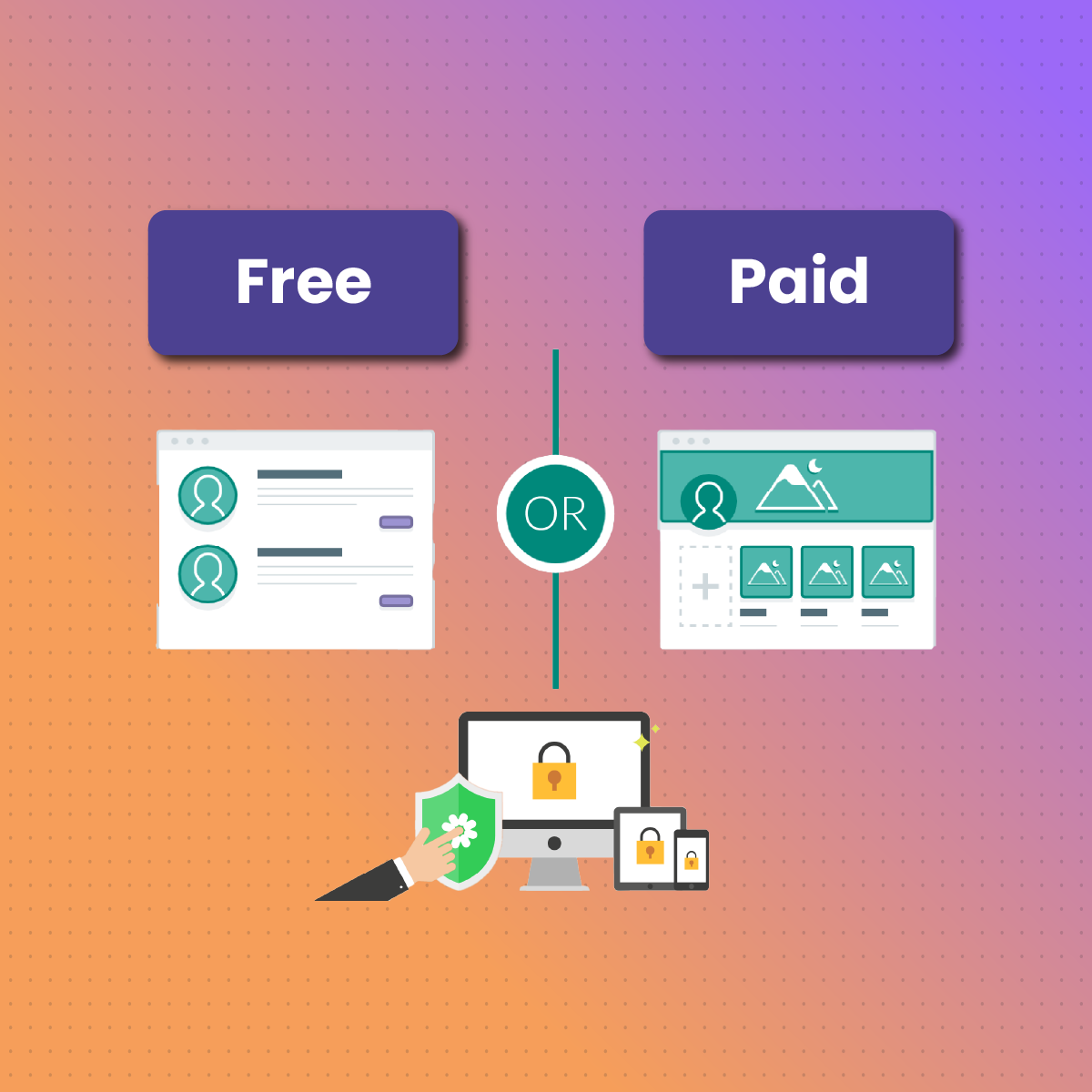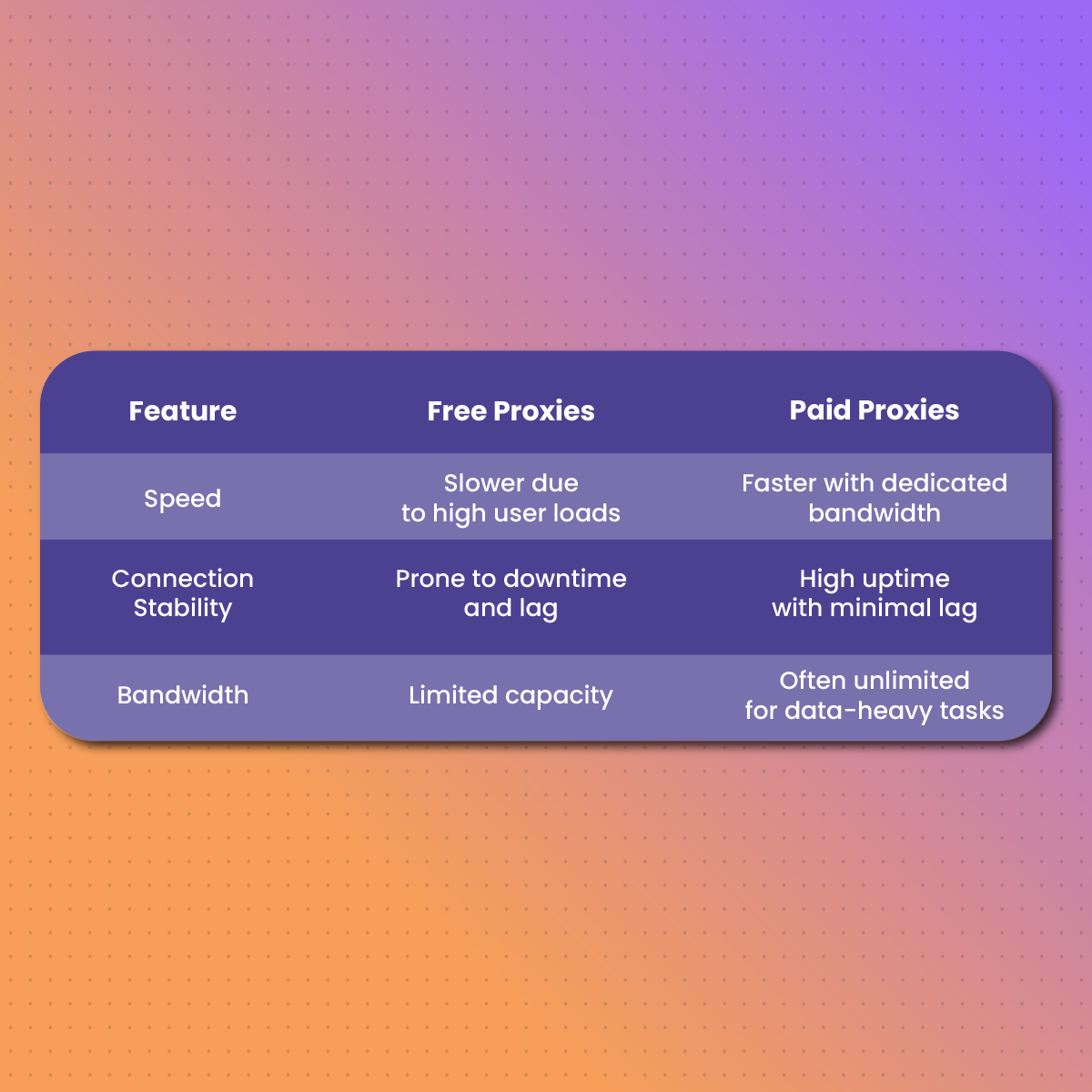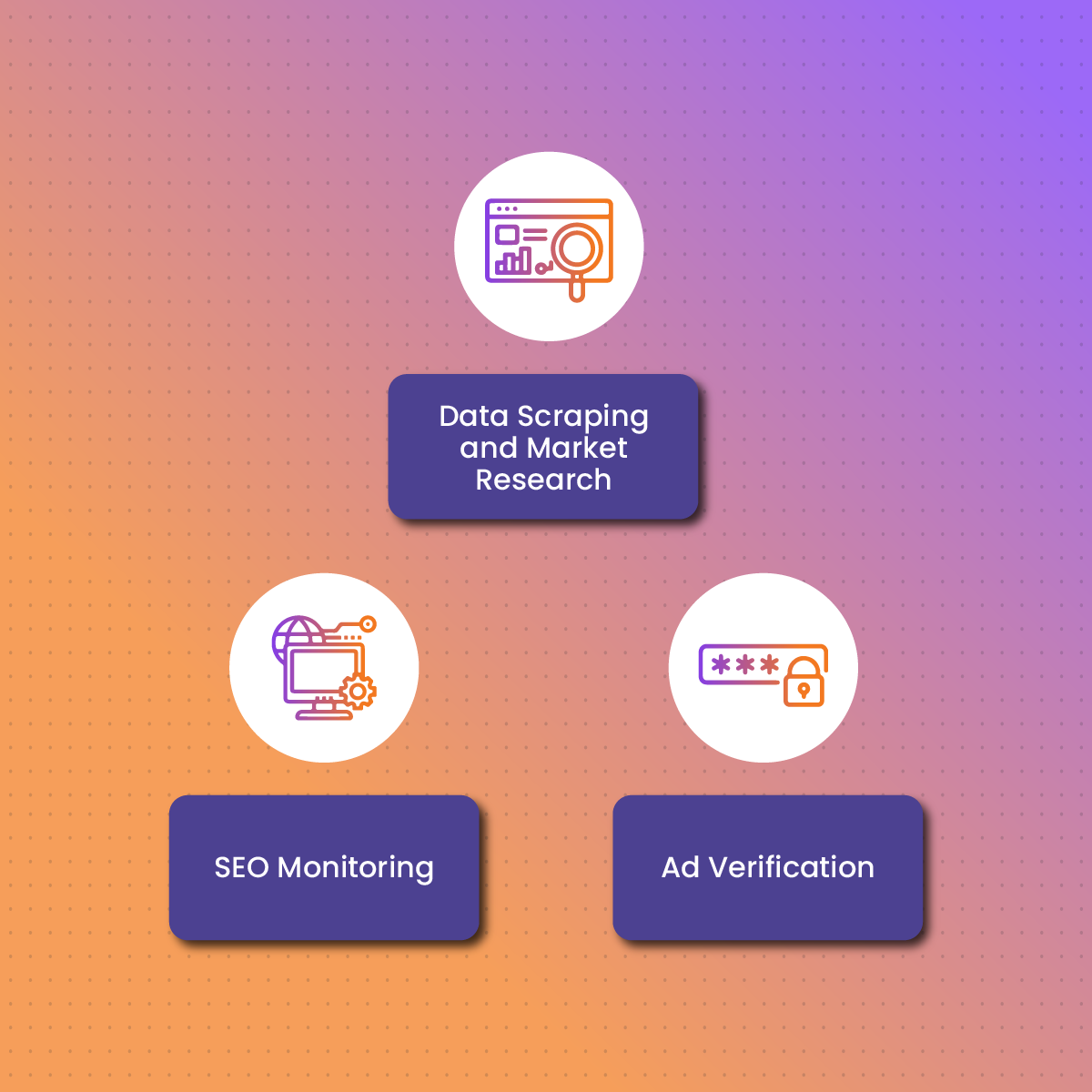Proxies are intermediary servers that route internet traffic from a user’s device through an alternate IP address, effectively masking the user’s real IP. They offer various benefits, such as enhanced privacy, bypassing geo-restrictions, and facilitating secure browsing. Proxies have become essential tools for both personal and professional use, enabling users to browse anonymously, access restricted sites, and perform data-heavy tasks like web scraping or ad verification.
This article explores what paid proxies are, how they differ from free proxies, the benefits of NetNut, and why they’re often the preferred choice for businesses and individuals alike.
What Are Paid Proxies?
Paid proxies are proxies provided by reliable, premium proxy services that require a subscription fee. Unlike free proxies, paid proxies offer dedicated resources, ensuring a faster, more secure browsing experience. Paid proxies come in various types—such as dedicated, shared, residential, rotating, and mobile proxies—each catering to specific user needs and offering unique benefits.
With paid proxies, users gain consistent access to high-quality IP addresses, which are crucial for tasks requiring speed, stability, and anonymity. These premium IPs also reduce the likelihood of detection by websites, providing more secure access for sensitive or data-intensive activities.
How Do Paid Proxies Work?
Paid proxies function by masking a user’s IP address and routing their internet traffic through an alternative server. This server, provided by the proxy service, assigns a new IP address to the user, concealing their real location and identity.
Paid proxy services, such as NetNut, offer robust infrastructures with high-speed servers, secure encryption, and large pools of IPs across multiple regions. By maintaining dedicated resources, paid proxies ensure uninterrupted access, efficient data processing, and enhanced privacy, making them ideal for business use and personal applications where quality matters.
Why Use Paid Proxies Over Free Proxies?
While free proxies might seem appealing, they often come with significant limitations. Free proxies typically lack the speed, security, and stability required for most tasks, particularly for professional or business use. Here’s why users and businesses prefer paid proxies over free alternatives:
- Reliability: Paid proxies are managed and optimized by dedicated services, ensuring minimal downtime and consistent performance.
- Speed: Free proxies are often overloaded with users, leading to slow connections. Paid proxies, however, offer faster connections and greater bandwidth.
- Enhanced Security: Paid proxies prioritize data protection with advanced security measures, reducing the risk of data breaches and malware.
- Support: Premium proxy providers offer customer support to assist with any technical issues, while free proxies typically lack support resources.
These advantages make paid proxies a better fit for users looking to ensure secure and efficient internet connections.
Key Benefits of Paid Proxies
Paid proxies offer a range of benefits that free proxies cannot match, including:
- Speed and Stability: Paid proxies provide high-speed connections essential for tasks like streaming, data scraping, and online gaming.
- Privacy and Anonymity: Paid proxies mask users’ real IP addresses, adding an extra layer of privacy by preventing websites and third parties from tracking their location or online activity.
- Unlimited Bandwidth: Many paid proxy services offer unlimited bandwidth, which is crucial for data-heavy activities and business operations.
These benefits make paid proxies a superior choice for both personal users and businesses requiring reliable, secure internet connections.
Performance Comparison: Free vs. Paid Proxies
When comparing the performance of free and paid proxies, several key differences emerge:
- Speed: Free proxies are often slower due to high user loads, while paid proxies provide dedicated bandwidth for faster, more efficient browsing.
- Connection Stability: Paid proxies maintain high uptime and minimal lag, making them ideal for uninterrupted tasks.
- Bandwidth: Paid proxies often come with unlimited bandwidth, ensuring smooth access to data-heavy tasks, while free proxies are often limited in capacity.
These performance benefits allow paid proxies to handle complex, data-intensive activities that free proxies cannot reliably support.
Security and Privacy: Free vs. Paid Proxies
Security and privacy are significant factors when choosing between free and paid proxies:
- Data Security: Paid proxies offer encryption and data protection measures, ensuring that user data remains secure. Free proxies may expose users to data theft or malware due to minimal security protocols.
- IP Masking: Paid proxies effectively mask the user’s IP address, providing an added layer of privacy. Free proxies, however, may compromise this feature, making users more vulnerable to tracking.
- Reliability for Sensitive Tasks: Paid proxies are trusted for tasks requiring confidentiality, such as accessing sensitive information, managing multiple accounts, and conducting business research.
For users who prioritize privacy and security, paid proxies are the safer and more reliable option.
Types of Paid Proxies
There are several types of paid proxies, each suited to different needs:
- Residential Proxies: Use real IP addresses from ISPs, offering high anonymity and a natural browsing experience.
- Rotating Proxies: Change IPs periodically, preventing detection during repetitive tasks like data scraping.
- Datacenter Proxies: Offer high-speed, server-based IPs ideal for accessing restricted sites and managing multiple accounts.
- Mobile Proxies: Utilize IPs from mobile carriers, offering flexibility and higher trust for mobile applications.
Each type offers unique advantages, enabling users to select proxies that align with their specific requirements.
Using Residential Proxies for Reliable Access
Residential proxies are among the most secure types of proxies available. They use IP addresses assigned by actual internet service providers (ISPs), making them appear as genuine user connections. Our residential proxies provide users with high-quality, ISP-assigned IPs that reduce the likelihood of detection and enhance security, making them ideal for sensitive tasks such as accessing restricted sites, conducting market research, or managing social media accounts.
With residential proxies, users benefit from enhanced privacy and a natural browsing experience. This type of proxy is especially valuable for businesses and individuals who need consistent, reliable access that doesn’t compromise on speed or security.
Rotating Proxies for Uninterrupted, Diverse Connections
Rotating proxies are a valuable solution for users who require a high level of anonymity and need to avoid detection over multiple sessions. NetNut’s rotating residential proxies automatically switch IP addresses at regular intervals, ensuring that each session appears unique. This is especially useful for repetitive tasks such as web scraping, ad verification, and other data-intensive activities where using the same IP repeatedly could result in detection or blocking.
Rotating proxies provide the flexibility of constant IP refreshes, enabling users to conduct their work without interruptions. They are ideal for businesses and individuals who need continuous access to online resources across multiple IPs.
Mobile Proxies for Flexible Access Across Devices
Mobile proxies offer the unique advantage of utilizing IPs from mobile carriers, which are more frequently trusted by websites and are difficult to block. NetNut’s mobile proxies provide users with dynamic IP addresses associated with mobile networks, making them highly effective for geo-restricted content access, social media management, and ad testing. With mobile proxies, users can access a wide range of platforms from multiple devices and locations, ensuring reliable connections even when switching networks.
Mobile proxies are especially beneficial for users who need to access content across various locations or want to appear as mobile users on websites.
Paid Proxy Performance in Business Use Cases
Paid proxies are essential tools for businesses conducting online activities that require stable, secure connections. Here are a few critical business use cases for paid proxies:
- Data Scraping and Market Research: Paid proxies allow businesses to gather data from multiple sources without detection. The high performance of paid proxies ensures efficient data scraping, enabling organizations to conduct competitive analysis and gain valuable insights.
- SEO Monitoring: Paid proxies enable businesses to monitor search engine rankings across different regions without being detected. This is crucial for companies looking to improve their SEO performance and track keyword positioning.
- Ad Verification: For advertising campaigns, paid proxies are used to verify ad placements and impressions across different locations. This helps ensure ad accuracy and improves campaign quality.
For businesses, the benefits of paid proxies go beyond just unblocking content. They provide the performance, security, and stability necessary to achieve business objectives efficiently.
Why Choose NetNut for Paid Proxies?
NetNut offers premium proxy solutions designed to meet the needs of both personal users and businesses. Here are some of the reasons why NetNut’s proxies are an ideal choice:
- High-Speed Connections: NetNut proxies are optimized for fast, stable access, providing a smooth experience for data-heavy activities and streaming.
- Privacy and Security: NetNut prioritizes user privacy by masking IP addresses and offering secure, encrypted connections, ensuring data protection during sensitive tasks.
- Flexible Proxy Options: With residential, rotating, and mobile proxies available, NetNut provides versatile solutions for various online activities and access needs.
NetNut’s high-performance proxies enable users to perform a wide range of tasks, from data scraping and ad verification to streaming and personal browsing, with confidence and reliability.
Frequently Asked Questions About Paid Proxies
1. Are paid proxies worth it?
Yes, paid proxies are worth the investment for users who require reliable, secure, and high-speed connections. Unlike free proxies, paid proxies offer dedicated resources, better performance, and enhanced privacy, making them ideal for both personal and professional tasks.
2. What is the cost difference between free and paid proxies?
Paid proxies typically range from affordable monthly plans to more advanced options for businesses, whereas free proxies don’t require payment but lack essential security and performance features. NetNut provides flexible pricing to meet different budget needs.
3. Can paid proxies be used for streaming and data scraping?
Yes, paid proxies are optimized for activities like streaming and data scraping, ensuring minimal interruptions and stable access. NetNut’s residential and rotating proxies are particularly suited for these tasks.
4. How secure are paid proxies?
Paid proxies from reputable providers like NetNut offer enhanced security features, including IP masking and encrypted connections, making them highly secure for online activities.
5. Are there specific types of proxies that work better for businesses?
Yes, residential and rotating proxies are often ideal for business tasks due to their reliability, high performance, and ability to avoid detection.









